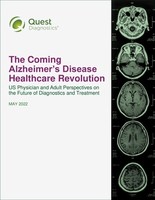Physicians Foresee an Alzheimer's Disease Treatment Revolution Supported by Advanced Testing Tools, New Quest Diagnostics Report Finds
Quest Diagnostics has introduced a blood test, QUEST AD-Detect™, to assess the risk of Alzheimer's Disease (AD), amidst rising optimism among physicians and patients for advancements in AD diagnostics and treatment. A recent survey showed 66% of physicians anticipate groundbreaking therapies, with 84% believing early risk testing will enhance disease management. However, cost concerns may hinder widespread adoption. Despite this, 87% of physicians think the blood test will become a standard practice, highlighting an evolving landscape in AD healthcare.
- Introduction of QUEST AD-Detect™ blood test for assessing AD risk.
- 77% of physicians believe new therapies will transform AD into a manageable chronic disease.
- 84% of physicians say early risk testing will improve disease management.
- 87% of physicians believe blood tests for early AD detection will become standard of care.
- 85% of physicians state blood test adoption depends on reimbursement coverage.
- 94% of physicians view blood tests as more cost-effective than invasive methods, indicating cost concerns may still impede adoption.
Insights
Analyzing...
Blood Test for Early Detection of Alzheimer's Disease (AD) Risk Will Lead to Better Patient Care, Physicians Say; U.S. Adults Call for Earlier Evaluation and More Education
Quest Introduces Widely Available Blood Test to Aid Early Assessment of AD Risk; Physicians Believe AD Blood Tests will Become Standard of Care
SECAUCUS, N.J., May 2, 2022 /PRNewswire/ -- Quest Diagnostics (NYSE: DGX), the world's leading provider of diagnostic information services, today released a new research report, The Coming Alzheimer's Disease Healthcare Revolution: U.S. Physician and Adult Perspectives on the Future of Diagnostics and Treatment, that provides insights into the expectations and hopes of primary care physicians and American adults for the current and future landscape of dementia and AD testing, treatment and care. According to the report, a majority of physicians (
While
Based on insights from online surveys of 501 primary care providers (PCPs) and 2,052 Americans aged 18 years and older, the report also highlights the important role diagnostics may play in the next era of AD healthcare. Quest Diagnostics commissioned The Harris Poll to conduct the surveys in March 2022.
The report suggests cost concerns could impede the adoption of blood tests for AD: more than 8 in 10 physicians (
"We are on the cusp of a new generation of therapies for Alzheimer's disease, but the important role of diagnostics has been missing from the conversation. Patients today are typically screened for Alzheimer's disease only after signs of cognitive impairment emerge and often by expensive methods, such as brain imaging and cerebrospinal fluid taps, which only specialists can perform. As new, efficacious therapies come to the forefront, the need for scalable, less invasive and more cost-effective diagnostics, including in primary care settings, will grow," said Michael K. Racke, M.D., Neurology Medical Director, Quest Diagnostics. "Our goal for this report is to help prepare the medical community and engaged patients and caregivers for the transformational healthcare shifts that must occur to unleash the full potential of future treatment and diagnostic innovations to improve outcomes for patients with Alzheimer's disease."
The new Quest report follows the Centers for Medicare and Medicaid Services' decision in April to limit coverage of the AD drug aducanumab to patients who receive it as participants in a clinical trial. The Food and Drug Administration's approval of the drug in June 2021 marked the first authorization of a treatment designed to target AD pathophysiology. In addition, the identification of biomarkers for AD has led to new avenues of pharmaceutical drug research and development. More than 100 disease-modifying therapies are now in clinical trials–nearly 20 in phase 3.i
To prepare for the treatments of the future, American adults call for earlier evaluation, want more education; physicians foresee surge in demand
U.S. adults want to be evaluated for dementia, including AD, earlier than current medical practice. While physicians say they begin evaluating patients for AD at about age 66 (mean), adults want to be evaluated for dementia, including AD, at about age 57 (mean)—a difference of nearly 10 years. And while
The large majority of physicians (
Quest introduces QUEST AD-Detect™ Amyloid Beta 42/40 Ratio; physicians believe blood tests will become standard of care
Quest Diagnostics is introducing the QUEST AD-Detect™ Amyloid Beta 42/40 Ratio, a new analytically validated blood test that aids in assessing the risk of AD.ii iii The laboratory-developed test is designed to be used by a healthcare provider to help assess the risk of AD in a patient. It evaluates the ratio of two peptides of amyloid beta, Aβ42 and Aβ40, in plasma sourced from a single blood test and is designed to monitor Aβ42/40 changes over time to assess the risk potential of AD progression. QUEST AD-Detect™ is a high-precision assay of a type shown in a recently published study to be as effective as traditional methods.iv
With a physician's order, patients may supply a blood specimen at a Quest Diagnostics patient service center for testing with QUEST AD-Detect Quest Diagnostics operates a national network of more than 2,100 patient service centers, for convenient patient access. In addition to providing accessible insights into the risk of AD, QUEST AD-Detect™ blood-based biomarker testing may also help identify patients who are candidates for early antibody treatment.v
"As scientists work to develop treatments for Alzheimer's disease, Quest Diagnostics is also developing laboratory innovations, such as AD-Detect, that have the potential to help physicians more reliably identify patients at risk for the disease, even before symptoms manifest, as well as monitor progression," said Chris Scotto DiVetta, Vice President and General Manager of Neurology and Pharma Services, Quest Diagnostics. "AD-Detect may also help biopharmaceutical companies seeking better methods of screening patients for participation in trials for AD therapies."
According to the survey, nearly 9 in 10 (
QUEST AD-Detect™ test is the latest example of how Quest Diagnostics is innovating within the AD landscape. Quest AD-Detect is based on a CSF test for aiding AD assessment developed by Quest Diagnostics in 2017. In addition, Quest has a long-standing history of advancing science in the field of dementia through academic research and other collaborations. More information is available at www.QuestForTheCure.com.
Study Methodology
On behalf of Quest Diagnostics, The Harris Poll conducted two online surveys in March 2022: one among 501 U.S. duly licensed primary care providers (PCPs) with a patient load of two or more, and another among 2,052 Americans aged 18 and older. Data for the PCP survey were weighted where necessary by age, gender and specialty to bring them in line with their actual proportions in the population. Data for the general population survey were weighted where necessary by age, gender, race/ethnicity, region, education, marital status, household size, household income and propensity to be online, to bring them in line with their actual proportions in the population. For more information, contact Kim Gorode, kimberly.b.gorode@questdiagnostics.com or Ellen Murphy, ellen.murphy@syneoshealth.com.
About Alzheimer's Disease
More than 6.5 million Americans are living with Alzheimer's disease, a number that is projected to more than double by 2050.vi As case numbers steadily rise, so is the disease's economic impact with related costs predicted to reach
About Quest Diagnostics
Quest Diagnostics empowers people to take action to improve health outcomes. Derived from the world's largest database of clinical lab results, our diagnostic insights reveal new avenues to identify and treat disease, inspire healthy behaviors, and improve health care management. Quest annually serves one in three adult Americans and half the physicians and hospitals in the United States, and our nearly 50,000 employees understand that, in the right hands and with the right context, our diagnostic insights can inspire actions that transform lives. Learn more at www.QuestDiagnostics.com.
i 2021 Alzheimer's Clinical Trials Report | https://www.alzdiscovery.org/uploads/media/ADDF-CTR-2021-06-singles.pdf. Accessed April 10, 2022.
ii Data on file. Quest Diagnostics; 2022.
iii Burnham SC, Fandos N, Fowler C, et al. Longitudinal evaluation of the natural history of amyloid-β in plasma and brain. Brain Commun. 2020;2(1)fcaa041. doi:10.1093/braincomms/fcaa041
iv Li Y, Schindler SE, Bollinger, J, et al. Validation of plasma amyloid-β 42/40 for detecting alzheimer disease amyloid plaques. Neurology. Online ahead of print, December 14, 2021.doi:10.1212/WNL.0000000000013211
v Cummings J, Lee G, Zhong K, et al. Alzheimer's disease drug development pipeline: 2021. Alzheimers Dement (N Y). 2021;7(1):e12179. doi:10.1002/trc2.12179
vi Alzheimer's Association. 2021 Alzheimer's disease facts and figures | https://www.alz.org/media/Documents/alzheimersfacts-and-figures.pdf. Accessed December 7, 2021.
vii Alzheimer's Disease Facts and Figures | https://www.alz.org/alzheimers-dementia/facts-figures#:~:text=years%20of%20diagnosis.-,Prevalence,living%20with%20Alzheimer's%20in%202022. Accessed April 11, 2022.
viii Special Report: More Than Normal Aging: Understanding Mild Cognitive Impairment | https://www.alz.org/media/Documents/alzheimers-facts-and-figures.pdf. Accessed April 11, 2022.
![]() View original content to download multimedia:https://www.prnewswire.com/news-releases/physicians-foresee-an-alzheimers-disease-treatment-revolution-supported-by-advanced-testing-tools-new-quest-diagnostics-report-finds-301536734.html
View original content to download multimedia:https://www.prnewswire.com/news-releases/physicians-foresee-an-alzheimers-disease-treatment-revolution-supported-by-advanced-testing-tools-new-quest-diagnostics-report-finds-301536734.html
SOURCE Quest Diagnostics










